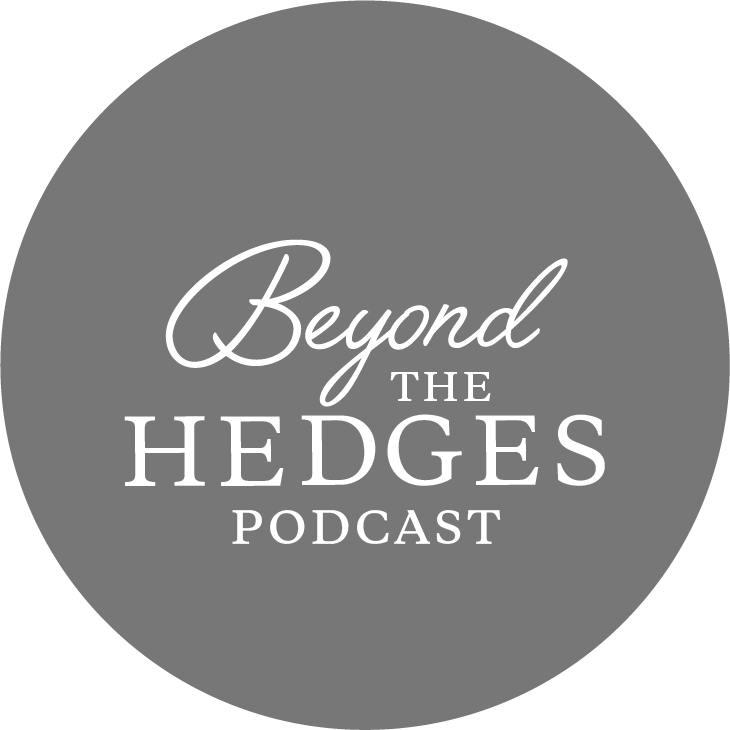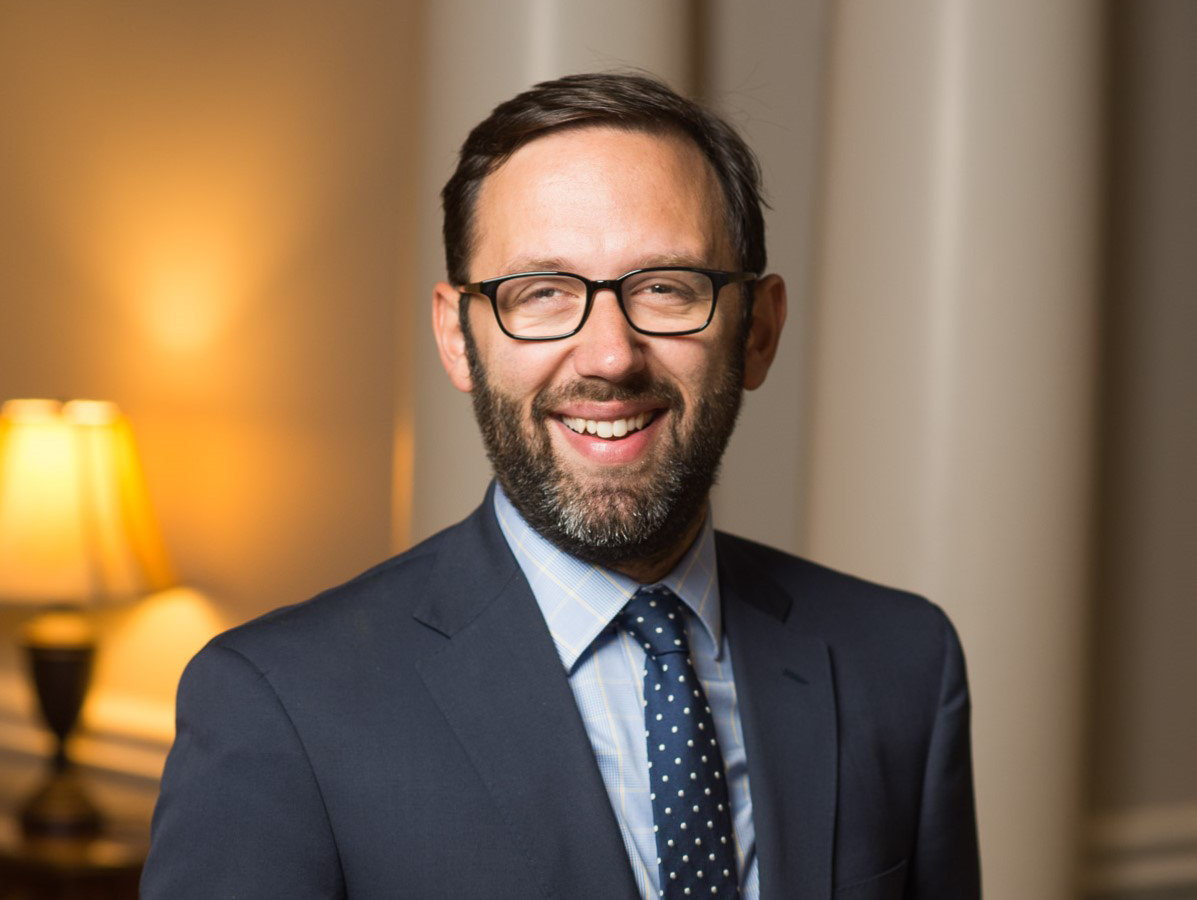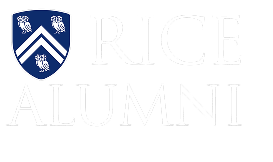Join Association of Rice Alumni past president David Mansouri ’07 each month as he explores the cutting-edge research, innovative ideas and inspiring stories shaping the Rice community. Whether he's talking with faculty on campus or with alumni who are making waves around the world, David brings Rice’s spirit of lifelong learning right to you — beyond the hedges.
Let us know you're listening and share your questions for future guests by completing this form. The Office of Alumni Relations will randomly pick listeners who fill it out to win some Rice swag!
Meet the Host: David Mansouri ’07
David Mansouri ’07 is President and CEO of the State Collaborative on Reforming Education (SCORE), which works to transform education in Tennessee. He also serves on the boards of the Policy Innovators in Education (PIE) Network and the Memphis Education Fund, and is a member of Stanford’s Hoover Education Success Initiative Practitioner Council. Mansouri is an alumnus of the Pahara-Aspen Education Fellowship and Leadership Tennessee and is a member of the Aspen Global Leadership Network.
Mansouri graduated with a BA in political science and music from Rice University in 2007 and holds an MBA with honors from Vanderbilt University’s Owen Graduate School of Management. While at Rice, he was a student of the late Sergiu Luca at the Shepherd School and was an active member of Will Rice College. Mansouri’s engagement with Rice includes serving on the ARA board (including a term as president), co-chairing the class of 2007 reunion giving committee and volunteering with Rice Alumni Volunteers for Admissions (RAVA) since 2008.
Episode 1: Shawn Miller
Digital Futures: AI's Role at Rice University
What does the future of learning look like in the age of artificial intelligence? In this episode, Associate Provost for Digital Learning and Strategy Shawn Miller joins host David Mansouri '07 to explore how Rice is reimagining education through technology and innovation. From lessons learned during the pandemic to the promise and pitfalls of AI-powered tools, Miller shares insights on how universities can prepare students for a rapidly changing world. Tune in to hear how Rice is shaping the next generation of digital education and what skills will matter most in an AI-driven future.
Episode 2: Alec Ajnsztajn and Jeremy Daum
Innovating the Future: Taking on Forever Chemicals with Coflux Purification
We recorded a special live episode of Beyond the Hedges at Alumni Weekend, where host David Mansouri '07 spoke with Rice alums and PhDs in material science and nanoengineering Alec Ajnsztajn and Jeremy Daum about their groundbreaking new venture. As co-founders of Coflux Purification, a company born out of the Rice Office of Innovation, they discussed the health and environmental dangers of PFAS “forever chemicals” and their novel solution that captures and destroys them using covalent organic frameworks and light. They also shared their academic and professional paths, reflected on Rice’s support and offered advice to aspiring entrepreneurs during an audience Q&A.
Episode 1: Fred Oswald
AI, Bias, and Ethics in Hiring
As AI grows and becomes more accessible, it's changing our lives in so many ways - including in the workforce. Our guest for this episode is an expert in the field of organization and workforce development and will tell us how AI is shaping the hiring process.
Fred Oswald is a Professor at Rice and the Herbert S. Autrey Chair in Social Sciences. His Organization & Workforce Laboratory (OWL) at Rice focuses on selection and job performance models in organizational, educational, and military contexts, as predicted by individual differences (such as personality and ability) as well as group differences (workgroup characteristics, gender, race/ethnicity, and culture).
Episode 2: Dr. Sabia Zehra Abidi
Innovations in Bioengineering and Education
How is the Rice Bioengineering Capstone Design course integral in the development of students in the bioengineering department and across all engineering disciplines? How do Rice students benefit from being at an institution that prioritizes premier teaching and research?
Dr. Sabia Zehra Abidi is an assistant teaching professor in bioengineering at Rice with expertise in stem cell research, microfluidics, and disease treatment. Dr. Abidi shares her journey through the field, from research to teaching, driven by her fascination with cellular communication and tissue engineering.
Episode 3: Troy Schaum
Urban Architecture for the Future
This episode was recorded live at Rice University’s Alumni Weekend 2024, and features host David Mansouri ’07 conversing with Troy Schaum. Troy is an associate professor in architecture at Rice and principal architect at SCHAUM Architects.
Troy and host David Mansouri ’07 discuss architectural philosophy, Troy’s journey into the field, and his work on significant projects such as the White Oak Music Hall. Troy provides insights into the concept of post-megalopolitan cities and how it shapes his research and design work. Additionally, the episode highlights how climate change influences current architectural practices and how that is reflected in the evolving nature of Rice’s architecture program.
Episode 4: Miguel Harth-Bedoya
Exploring the World of Music
Miguel Harth-Bedoya is an Emmy-winning and Grammy-nominated conductor, and also the Mary Franks Thompson Professor of Orchestral Studies at Baylor University and overseer of the Shepherd School’s preeminent orchestral programs in the 2025-26 season.
Miguel and host David Mansouri ’07 discuss Miguel's journey to finding a love for music and he explains some about his philosophy on conducting. They talk about Miguel's educational initiatives, his thoughts on the future of classical music - the surprising reason why he wouldn’t use that word himself, and his commitment to community engagement, working with kids, and broadening the audience for orchestral music. Harth-Bedoya also discusses conducting Peter and the Wolf featuring John Lithgow in both English and Spanish, his upcoming role at Rice and his plans to enrich and expand the school's musical outreach.
Episode 5: Sylvia Dee
Navigating Climate Challenges and Solutions
Sylvia Dee is an assistant professor and climate scientist at Rice University specializing in climate change and the past, present, and future of Earth’s hydrological cycle. Sylvia’s research focuses on how Earth’s modes of natural variability, like El Niño and La Niña events, compound with climate change to alter the characteristics of weather and climate extremes, such as flooding hazard on the Mississippi River. Her lab evaluates climate model data to understand future risks to human and natural systems.
Host David Mansouri '07 dives into Sylvia's background, her research on paleoclimatology, and the application of historical climate data to predict future climate scenarios. They also discuss the sources of carbon emissions, and extreme weather events like hurricanes and floods.
Episode 6: Haotian Wang and Bryan Guido Hassin ’01, ’02
Leveraging Rice Research for Climate Tech Innovation
Host David Mansouri ’07 discusses how Rice research is propelling commercial and business innovation, particularly in mitigating carbon emissions with Haotian Wang, associate professor in the Department of Chemical and Biomolecular Engineering at Rice, and Bryan Guido Hassin ’01, ’02, entrepreneur and the CEO of Dexmat, a Rice spinout. Exploring their educational backgrounds and career trajectories, David asks Brian and Haotian about their groundbreaking work in sustainable energy solutions and carbon-negative materials. They elaborate on their entrepreneurial journeys, the challenges they face in commercializing research, and the unique advantages Rice University and Houston offer for energy and sustainability research.
Season 2
(Hosted by Kate Coley '11, former associate director of alumni programs.)
Episode 1: Alan Russell
Disability is a Diversity Issue
“Am I disabled because of my impairment or am I disabled because of attitudes in society?” This thought-provoking question is posed by this episode’s guest, the Director of the Disability Resource Center here at Rice University, Alan Russell. Whether visible or invisible, disabilities affect so many different people, but they are still stigmatized by society. Russell discusses barrier free accessibility, making sure to practice compassion instead of pity, and the importance of intersectional work that includes disability within the movement for diversity, equity, inclusion and social justice.
Episode 2: Eden King
Workplace Allyship
How do unconscious, embedded stereotypes shape our behavior towards each other? And how do these behaviors subtlety affect a person’s self-confidence? Eden King, Lynette S. Autrey Professor of Psychology, conducts research that seeks to guide the equitable and effective management of diverse organizations. Listen in as she discusses her eye-opening findings on women in the workplace, parenting during lockdown and how to be an ally to your colleagues.
Episode 3: Luis Duno-Gottberg
What is Hate?
“Hate is not something you can be indifferent about and just find middle ground. You have to denounce it whenever you find it,” says Luis Duno-Gottberg. In this episode, the Professor of Caribbean and Film Studies discusses his experience teaching one of the Humanities Department’s “Big Question Courses.” The question he and his students contend with is “what is hate?” Duno-Gottberg’s cross-disciplinary approach to the course and this conversation leaves a lot to think about both within ourselves and in our global community. His research on how subverting images of hate can be incredibly impactful hits home within the hedges, as he discusses the decision to move the statue of William Marsh Rice instead of simply removing it from the quad.
Season 1
(Hosted by Kate Coley '11, former associate director of alumni programs.)
Episode 1: Scott Solomon
Wisdom of the Ants
How can ants teach us to be more efficient? Most of us think of ants as a picnic pest on the hunt for food, but ants are actually members of societies that function as complexly as ours with divisions of labor and specialties. They grow their own food on a mass scale, develop pesticides and prepare in case of food scarcity, all without ever experiencing a traffic jam. In this episode, Rice Associate Teaching Professor and Evolutionary Biologist Scott Solomon will discuss his research into what makes ant colonies such a successful model for efficiency.
Episode 2: Kirsten Ostherr
Contagion Media and COVID-19
COVID-19 is constantly on our minds and on our screens. How has the history of contagion media shaped the way we respond to and think about pandemics like this? How do we handle the shifting paradigm of health communications in a digital age? In this episode, Kirsten Ostherr, director of Rice’s Medical Humanities Program and Medical Futures Lab, discusses representation, social media, marginalized communities and the dangers of misinformation around the global crisis.
Episode 3: Tony Brown
Racial Trauma
The killing of George Floyd has caused global protests around racial injustice and white supremacy. How does the stress of racial trauma play out in the lives of people in Black and Brown communities? What can we do as a global Rice community to fight racial injustice? Join guest host Vanity Hill, assistant director of alumni regional outreach, as she explores these topics with Tony Brown, sociology professor, race and racism scholar and director of the Racism and Racial Experiences Workgroup.
Episode 4: Anthony B. Pinn
The Fallacy of Racial Colorblindness
When people say they don’t see color when it comes to race, is this actually a dangerous social lie that means people don’t have to be held accountable? Colorblindness is “premised upon problematic thinking that has framed race relations in the United States… [and is] based upon the assumption difference is a problem to solve, but in wiping out difference we allow whiteness to remain normative,” says Anthony B. Pinn, the Agnes Cullen Arnold Professor of Humanities, professor of religion and director of the Center for African and African American Studies. In this episode, Professor Pinn discusses the fallacy of colorblindness as an anti-racist solution, the sustainable changes hip hop has created for the Black community, and what the global Rice community can do to fight racial injustice.
Episode 5: Robert Stein
Voting in 2020
With the huge political divide in the United States, fears around how to vote safely during a pandemic and the recent passing of Justice Ruth Bader Ginsburg, the upcoming presidential election is unlike anything we’ve seen before. What will it take for Americans to feel safe while voting in the wake of COVID-19? What are the concerns around mail-in voting, and are they valid? In this episode, Robert Stein, the fellow in urban politics at Rice’s Baker Institute for Public Policy and the Lena Gohlman Fox Professor of Political Science, discusses his research on voting in a pandemic, mail-in voting and what it truly means to exercise your right to vote.
Episode 6: Stephen Klineberg
Houston Part One: Oil Boom to Bust
In the first episode of this three-part series, Stephen Klineberg discusses the research found in his book “Prophetic City: Houston on the Cusp of a Changing America,” covering the early days of Houston up until the oil boom bust in 1982. Klineberg is a professor emeritus of sociology at Rice and the founding director of the Kinder Institute for Urban Research. His surveys of Houston over the last 40 years have captured the city’s transformative changes, and why Houston, as he puts it, “is where, for better or worse, the future of our nation is going to be worked out.”
Episode 7: Stephen Klineberg
Houston Part Two: Unequal Opportunity in a Paradoxical City
The second installment of this three-part series with Stephen Klineberg, professor emeritus of sociology, founding director of the Kinder Institute and author of “Prophetic City: Houston on the Cusp of a Changing America,” explores more findings from his 40 years of surveying Houston, including research showing how, as he puts it, “Houston has the greatest medical complex in the world – and yet – has the highest percentage of children without medical insurance of any major city in America.”
Episode 8: Stephen Klineberg
Houston Part Three: It's Up to Us
In the final episode of our three part series with Stephen Klineberg, we grapple with how to make Houston successful in the 21st century given the deep class divides, inaccessibility to quality education, and exploitation of immigrant workers. Steve says “the story of America is the story of immigrants, and we need to get back to that… I tell people all the time that if Houston’s African American and Latino young people are unprepared to succeed, it is impossible to envision a prosperous future for Houston. That is who we are and will be as the 21st century unfolds.” Houston has work to do, but Steve, along with his 40 years of survey data, is hopeful that the city is up to the task.
Stick around to the end for a new segment where Kate features a new Rice student each month to talk to them about a Rice-related passion project. This month's featured student is undergraduate McMurtry senior Alex Curylo.
Episode 9: Alexander Byrd and Caleb McDaniel
The Docs
Every Friday at noon during the fall and spring semesters, you can find Byrd and McDaniel leading a live webinar on Zoom for the Rice community, examining and discussing old documents and photographs from Rice’s past. Through a series of weekly webinars called Doc Talks, the history professors illuminate important research from historians and students with regards to racism and racial injustice. The webinars are then turned into podcast episodes and feature an added analysis by Beyond the Hedges host Kate Coley ’11. It’s just one way the university’s Task Force is working to encourage honest discussion around Rice’s history. Get to know these revolutionary Rice leaders in a more intimate setting on the Beyond the Hedges podcast as Byrd and McDaniel give listeners a behind-the-scenes look into their journeys at Rice, the process for creating and making Doc Talks, interesting findings thus far and more.
Stay tuned until the end to hear from undergraduate student researcher, Indya Porter, talk about what she’s been working on for the Task Force.











